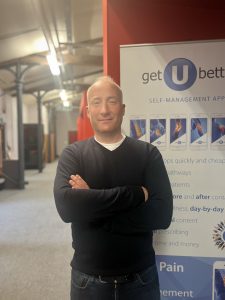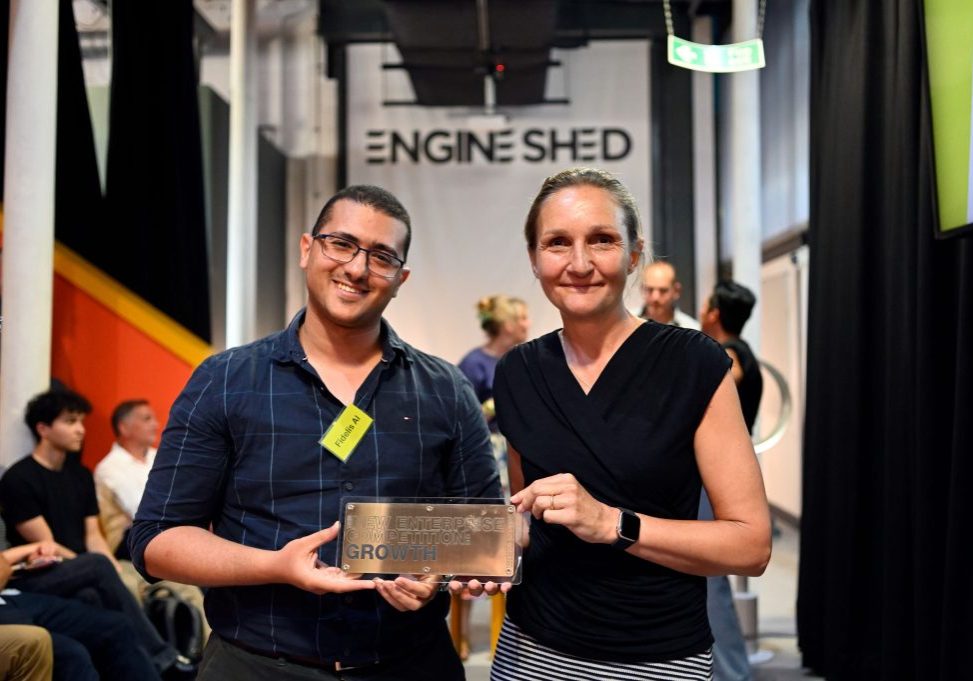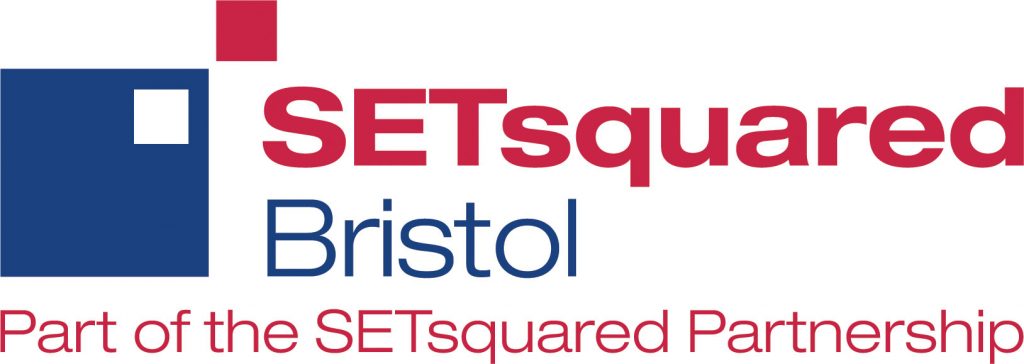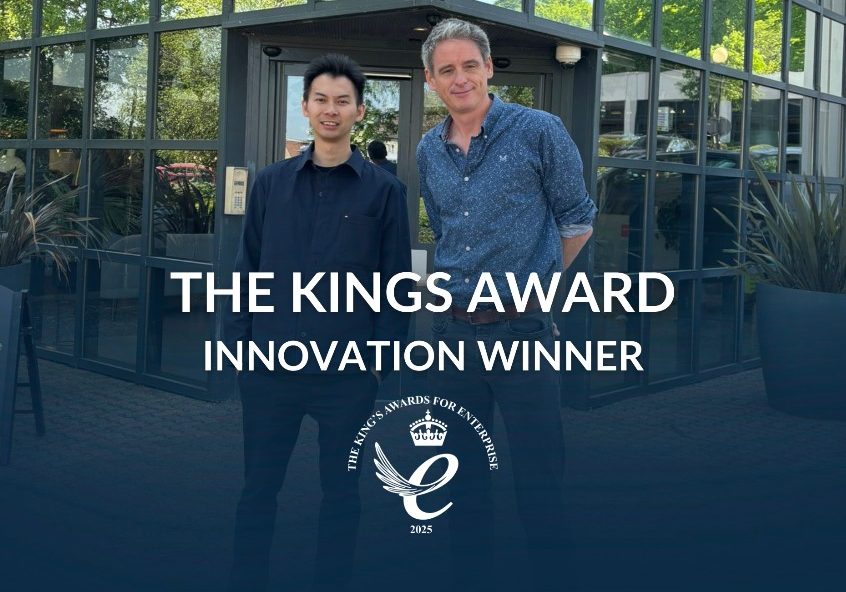getUBetter: Digital self-management for musculoskeletal conditions
Posted by
SETsquared Bristol
Following our member getUBetter’s partnership with numerous NHS trusts and invitation to join the NHS Innovation Accelerator, we had a chat with Founder and CEO, Dr Carey McClellan, to hear his story…
 getUBetter key facts
getUBetter key facts
- Start date: 2013
- Market sector: Healthtech
- Location: Bristol
- Number of employees: 30
- Company growth status: Scaleup
In your own words what does getUBetter do?
We provide digital self-management for all common musculoskeletal injuries and conditions, such as back and leg pain, neck pain and knee pain. getUBetter helps Integrated Care Systems (regions of the NHS) to provide digital self-management across their entire care pathways. We also help patients to trust their recovery and have the confidence to self-manage and use less healthcare resource.
getUBetter is the only solution that is able to support digital self-management across the entire care pathway. What that means is, it’s provided before somebody reaches out for help, in the community, at health centres, pharmacies, and soon via the NHS app. Whenever anybody reaches out for help they get connected to an approved regional self-management journey to support them. This includes providing safety netting and navigation back into the system when they need it. We help patients to safely wait because waiting lists are getting bigger. And importantly, when patients are back to normal, we then convert into a prevention tool to support them to live well with their condition, helping anybody that might have a reoccurrence.
The benefits include reduced GP and physio appointments and less prescriptions. Our research shows that people provided with getUBetter when they visit their GP are two thirds less likely to go to the emergency department. And if you give getUBetter to people on waiting lists, they’re 50% less likely to not need the appointment. So we’re helping patients, we’re helping the care system, and we’re helping the clinicians.
How did you start this journey?
I’m a physiotherapist and my specialist area is the management of musculoskeletal injuries in the emergency/urgent care setting. I worked at the University Hospitals Bristol Weston NHS Foundation trust for 17 years as an Advanced Physiotherapy Practitioner. I was also a researcher and did a PhD into health economics at the University of the West of England. This looked at how you should manage injuries that present to emergency departments in the UK. That’s where I had the idea of building a condition journey platform that can support not just the patient, but clinicians and the health system.
In 2012, I created the getUBetter B2C platform for back pain. We put it on the App Store and nobody bought it! In 2017 we pivoted to a B2B2C SaaS model with a platform, and built a team to support change and the management of patients across this whole area. We were then approached by a clinical commissioning group in London Wandsworth, that had the problem of over-treatment but no support for patients to self-manage. They asked us to configure the product for their area and deploy into their health system.
So instead of putting it on the App Store, we started to integrate it into the health system at every GP practice across Wandsworth. Then we were lucky enough to be awarded an NHS England SBRI Healthcare award to develop our platform and app to be scalable for multiple conditions and healthcare providers. We’ve gone from a single area of London to providing getUBetter into 4/5 of the city.
How has SETsquared Bristol support helped?
SETsquared Bristol helped us massively at that early stage when we were smaller and changing the business model. The business review panels were super helpful to focus the mind and provide direction at the early pivoting stage. The mentorship from the Entrepreneurs in Residence was fantastic, as well as the workshops and expert advisers, such as lawyer and IP.
Growing at SETsquared has been amazing. Now we’re using SETsquared Bristol in a different way. We get a lot out of the ecosystem and being part of the community here. We value conversations with the SETsquared team, as well as having a dynamic environment at Engine Shed to grow flexibly. And we can tap into the business support sessions and workshops as and when we need them.
Tell me about joining the NHS Innovation Accelerator and partnering with NHS trusts.
The NHS Innovation Accelerator is a very competitive process with ten companies selected each year that meet the short and long-term strategies of the NHS with proven effectiveness and scale. We are pleased to be awarded a place. They run a great program for understanding the NHS, that only the NHS can do. I’m also a NHS Innovation Accelerator Fellow, a three-year post, which is really useful for recognition, validity and networks.
Our main customer is what’s called an Integrated Care Board (ICB). England is divided into 41 of these and they purchase care for their regions. Our area, Bristol, North Somerset and South Gloucestershire, is one Integrated Care Board that have purchased a three year license for getUBetter under a framework. Through this we deliver self-management for all common musculoskeletal conditions across the whole region. Any patient who goes to their GP or Physio gets access to the Bristol, North Somerset and South Gloucestershire MSK app, which is powered by getUBetter, to support self-management and connect to the system if needed. People can access getUBetter via self-referral for example from their GP website or via prescription as part of routine care. We now replicate this model around the country. As well as the South West, we now have contracts in London, the Midlands and up North to deliver care. It’s quite overwhelming at times but very exciting to think that our company is providing help and value to people living across these regions, and is now supporting 36% of NHS England.
What advice would you give to other healthtech entrepreneurs looking to sell into the NHS?
Firstly, I would say it takes about eight years to succeed in the NHS. You have to set the right expectation. Very few companies can be ready and developed enough to provide technology for the NHS in less time, and it sometimes takes longer.
My second piece of advice would be to listen and understand the needs of your customers. You have a great idea, but your great idea does need to be modified to meet the needs of the people that are going to buy it. And adapting is really important – your idea will not fit their mould. That’s what we did. We fundamentally changed and have co-designed getUBetter to fit the system and I think that’s why we’re doing so well at the moment.
Lastly, don’t give up – utilise the amazing wealth of knowledge, experience and funding streams that are available for you to make the necessary changes. For example, SBRI Healthcare phase 2 contract with NHS England enabled us to develop and optimise our product into something that was fit for purpose for the NHS and ready to scale.
What’s next for getUBetter?
The next stage for us is about expanding our “total” musculoskeletal health package to include all aspects of a patient’s needs including waiting list support, orthopaedic operation support, women’s pelvic floor health and other conditions. We will continue to grow and contribute to digital self-management across the NHS whilst exploring new avenues for our technology. Our team of clinicians, transformation experts, project managers and developers are amazing and will continue to grow with the purpose of transforming the way people can self-manage musculoskeletal problems across the NHS.
Recent News, Blogs and Stories



